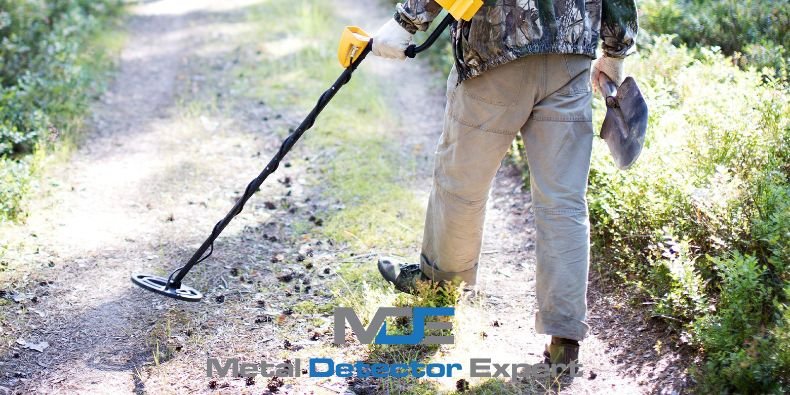Can a Metal Detector Detect Aluminium?
If you figuring out what hidden metals and objects your metal detector might be able to find, your probably wondering if the non-magnetic aluminium is detectable through a metal detector?
Well, the answer to that question is yes! Aluminium has quite high electric conductivity, meaning it can be picked up by nearly any kind of metal detector from its coils, however, the condition, soil and size of the aluminium may adjust how well your device can detect this aluminium.
You might now be asking yourself what other types of metals your detector can pick up and how it can detect aluminium, so we have put together an easy to follow the guide below that will tell you everything you need to know about detecting aluminium with your device.
What Is Aluminium?
Before we dig any deeper about how to detect aluminium with your metal detector you should understand what this type of material is.
Aluminium is a cheap element that is highly conductive and found in lots of industrial and household products. It is also used in many alloys and has a strong and lightweight feel.
Types Of Aluminium Objects You Can Find With Your Metal Detector
So if your metal detector can detect aluminium objects successfully you might be querying what types of aluminium objects you are likely to find.
Common aluminium objects are old electronic devices, cans, car parts and even bike frames which can all be recycled.
What Types Of Metals Can a Metal Detector Detect?
Now we know a metal detector can find aluminium easily, it’s important to understand how a metal detector can see these types of metals, resulting in different detections between alloy and pure metal types.
We have listed these three main types of metals that your detector can see below.
Non-ferrous Metal
This type of metal does not include iron and relates to metals such as; copper, zinc, aluminium and nickel.
These types of metals are additionally non-magnetic yet have great conductivity and can be picked up by metal detectors, even though many people would assume that they are hard to detect due to there non-magnetic properties.
Ferrous Metal
Ferrous metal on the other hand does contain iron and includes metals such as steel. This type of metal is attracted to magnets and can rust easily, it also picked up well by a metal detector just like non-ferrous metals.
Stainless Steel
High-quality stainless steel is non-magnetic and low-quality stainless steel is. This type of metal has a low conductivity and is very hard to detect with a metal detector out on the field.
How Can a Metal Detector Detect Aluminum?
A metal detector detects aluminium through its two main parts; the coil and the control box.
We have put a small explanation below about how this system works to alert you when it finds aluminium.
The Search Coil
Firstly, your metal detector uses its search coil to detect aluminium. This search coil comes in two parts; the transmitter coil and the receiver.
To detect aluminium, the transmitter coil flows out electricity at its frequency and creates a magnetic field, you can then search for objects in this field by sweeping your detector back and forth and waiting till the receiver coil on your detector gets alerted to a new object.
The Control Box
After the receiver coil picks up a signal, it then passes this to the control box. A control box on a metal detector is the part of your device which decides if the metal picked up is worth signalling to the user or not.
This box signals sound and can display information about the metal on higher-end models.
Should I Set My Metal Detector To Find Aluminium?
You might be questioning if you can set your device to specifically search for aluminium objects or not. The best way to look for aluminium with your detector is to either change the sensitivity of your device or set it to look for relics.
It’s best to use a high-quality model that can let you select an option to find specific metals such as aluminium, if you choose for your detector to focus on finding a group of metals such as non-ferrous metals then your detector is likely to be beeping constantly as it will pick up objects such as forks and knives in the ground.
Be prepared to find a fair amount of aluminium junk before you discover something worthwhile!
How To Discriminate Between Metals With Your Metal Detector
So as you cannot waste time looking for all different types of metals, it’s a good idea to use a metal discrimination chart that should come with your device. Some of the best metal detectors will play different sounds according to different metals and others will have a graphics chart as part of there device.
We have listed out some simple steps below that will help you read a metal discrimination chart.
- Choose the metal you wish to detect – To start understanding your metal discrimination chart you need to specify which kind of metal you are looking for, this could be something small like coins. If you don’t know what metal you want to look for its best to choose the all-metal mode.
- Specify the material – Now you have narrowed down the metal type you wish to look for, you should also select the type of material you want such as nickel or stainless steel, you can miss out on material like aluminium as this often found in a lot of rubbish (unless you want rubbish to recycle).
- Check the results – Once your metal detector decides it has found something important, you can check the chart on your device to see if its the right number or bars according to the material, normally, the greater the conductivity of the material means the higher value it will create.
Frequently Asked Questions About Using Metal Detectors To Detect Aluminium
What metals does a metal detector find?
Metal detectors can find metals such as; stainless steel, bronze, gold, nickel, iron, copper and aluminium.
These types of metals are separated between non-ferrous metals and ferrous metals, gemstones, diamonds and pearls cannot be detected by a metal detector and anything else which is not conductive.
How do I select what metal types I want my metal detector to find?
You can choose which types of metals and materials you want your metal detector to find by using the discrimination setting on your device.
This discrimination setting will operate differently according to the quality of your model, with some offering better selections than others, but in general, you can choose to only pick up metals with high conductivity.
What does ground balance on a metal detector mean?
The ground balance on a metal detector means the mineralisation in the soil you are searching on, metal detectors that have this feature allow you to filter out the mineralisation that’s in the ground and give more accurate readings.
On some models this automatic and in others you may have to set a preset manual mineralisation level to determine how it filters.
Can every type of metal detector detect aluminium?
No, some metal detectors are not designed to find aluminium, however, most can, these detectors often have settings to opt-out of finding aluminium due to the amount of trash that contains it.
Can Metal Detectors Detect Both Aluminium and Copper?
Yes, metal detectors detecting copper can also detect aluminium. Both metals have unique electromagnetic properties that allow metal detectors to identify them. However, the sensitivity and depth of detection may vary between the two metals due to their different conductivity levels.
Final Words
To conclude, most general metal detectors will pick up aluminium because of its high conductivity, you can set your discrimination settings on your device so as it will specifically single out aluminium objects if you want to be more specific.
A metal detector can additionally pick up non-ferrous metal and stainless steel, so if you want to avoid being alerted to rubbish too often, deselect the aluminium option and pick metals that are likely to be more valuable.




